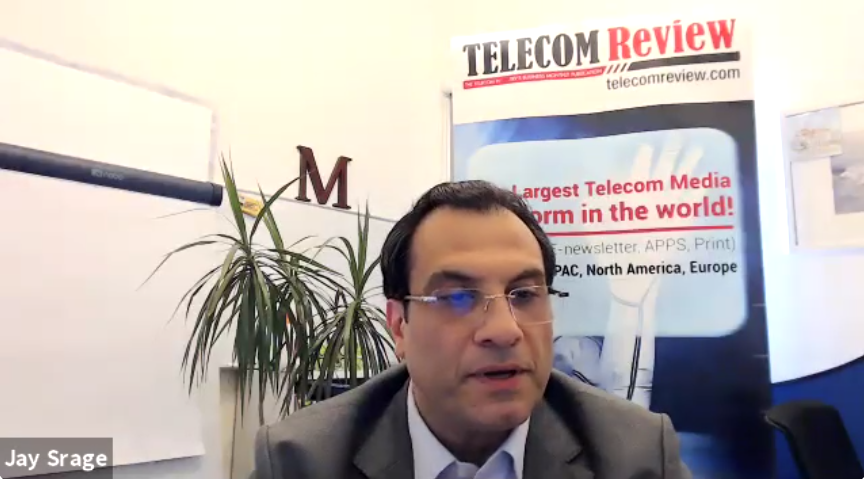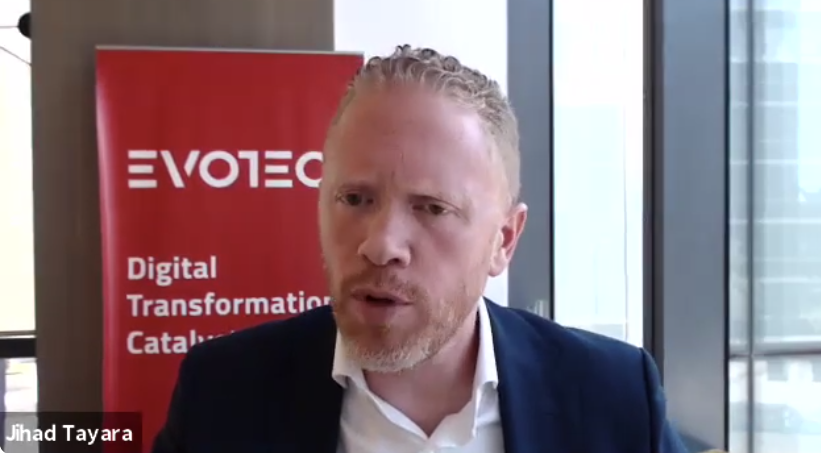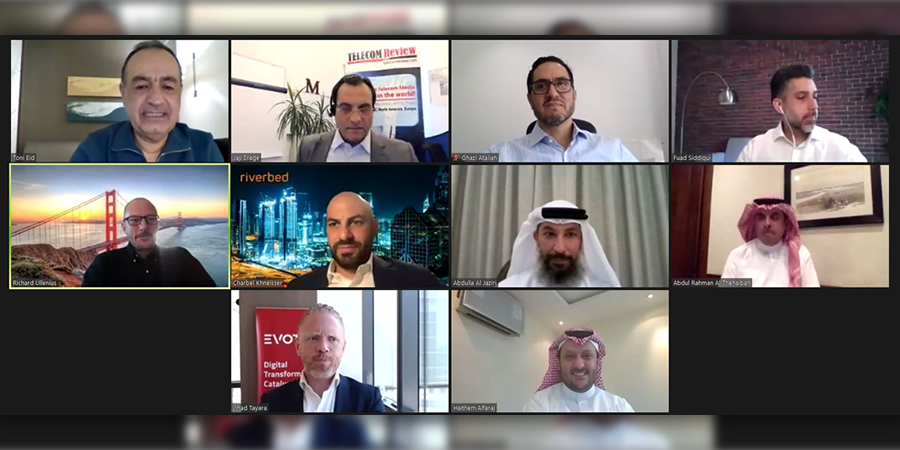Telecom Review, the world's leading telecoms news platform, held a virtual panel, entitled 'Digital transformation: A necessity brought forward by COVID-19' on September 22nd.
The panel was attended by around 300 participants and featured some of the industry's most esteemed professionals from across the world.
Telecom Review's CEO and founder, Toni Eid, gave the opening speech, and the panel was moderated by Centrigent's CEO, Jay Srage. The panelists included: Abdulla Al Jaziri, VP Corporate Strategy at Etisalat Group; Haithem Alfaraj, Senior VP of Technology and Operations Unit, stc; Abdul Rahman Al Thehaiban, Senior VP of Oracle MEA and CEE; Ghazi Atallah, CEO of NXN; Jihad Tayara, CEO of EVOTEQ; Fuad Siddiqui, Executive Partner and VP of Nokia Bell Labs; Richard Ulenius, VP Global Managed Services, CSG; and Charbel Khneisser, Regional Director of Technical Sales at Riverbed.
Jay Srage welcomed the panelists and attendees by stating, "I would like to start by recognizing the great job Telecom Review and Toni Eid have done, in continuing to connect the industry leaders and to discuss the topics that affect us as a whole. When we say that we are virtually connecting industry leaders, it is truly a representation of the topic of discussion today."
"The fact that we have moved from speculation earlier in the year and the impact of COVID-19 on the economy, a lot of people were talking about how the telecoms sector was going to react but it was not based on fact, it was based on the speculation of what the impact would be. 9 months into the pandemic, I think we have come to realize what is happening and we can now explain more about our impact, how the leaders in each sector of the industry have adapted and what their views of the future are," he continued.
To kickstart the discussion, Srage spoke about how both public and private enterprises have come to realize the importance of digital transformation, noting that this has become a necessity. He then proceeded to ask Haithem Alfaraj, stc's Senior VP of Technology and Operations Unit, about how digital transformation can be accelerated and the role that Telcos could play in this.
Alfaraj said, "Digital transformation was a trend which started 8 to 10 years ago. Companies began to talk about their intention to transform to be in the digital space but I think COVID-19 was really a wakeup call for most organizations to accelerate their digital transformation plans. If you look at the statistics, even before the pandemic, there was a very small percentage of companies that succeeded in their digital transformation. I think that what succeeded in that era were startups, especially those which were established in 2007 and 2008. We have seen parts of the digital hyperscaler accelerate very well compared to the incumbent companies."
He added that digital penetration and transformation will be a determining factor in companies' revenues going forward.
"Organizations really need to start to accelerate their transformation plans. There are multiple dynamics, I would say, that can reassure the success of organizations to succeed and this goes back into revamping company strategy and following a prioritize-based approach to determine which path of digital transformation needs to be taken," he said.
According to Alfaraj, hybrid IT seems to be gaining greater traction across the region. He noted that mastering hybrid IT is going to be one of the key steps in companies' overall transformation journeys.
"For us, as technology people, we have realized the importance and the need to be two steps ahead from the business to accelerate," concluded Alfaraj.
"Digital transformation involved getting companies to promote an open architecture model. Maybe in the past, organizations were limited to developing everything at the source but with the interconnections that we are beginning to see between service providers, cloud brokers, and customers, we can expect to be moving towards the hybrid cloud. Telcos will have to eventually integrate with cloud hyperscalers and this isn't an easy journey because it involves very deep architectural complexity. What is important is the concept of partnerships. In the telecoms industry, this was very weak. I think that to accelerate our digital journeys, the concept of partnerships needs to be enforced moving forward."
Following this, Abdulla Al Jaziri, VP Corporate Strategy at Etisalat Group stated, "2020 has been difficult for everyone across the globe. One positive aspect is the acceleration of digital transformation."
"In the UAE, digital transformation is part of our DNA – It is a journey and everyone is participating. This is strongly supported by our infrastructure, and being one of the top countries in fiber penetration. At Etisalat, we drive the digital future to empower society."
Indeed, many countries suffered at the beginning of the pandemic. They were simply not prepared to deal with the repercussions brought about by the virus. The UAE's strategy in dealing with the spread of the virus was nothing short of innovative.
"Other countries asked their people to stay at home. In the UAE, we asked them to work from home. Some countries suspended schooling for the rest of the year but in the UAE, we moved education to the online space to ensure that students continued studying. This did not happen due to luck, it was brought about my continuous work by both Etisalat and everybody in this country."
Srage then shifted the discussion towards Ghazi Atallah, CEO of NXN, a company that has been heavily involved in the country's digital transformation.
"In terms of the Telco's role and what is happening in the digital transformation aspects of governments or enterprises at large. The Telco has a tremendous role to play as they can emphasize the idea of being the people who are providing the connectivity and cloud services today. The concept of cloud is evolving to become much more of a service delivery environment rather than an infrastructure delivery environment," said Atallah.
"Digital transformation is not as much a technology story as it is a transformation story. Organizations and companies need to understand the challenges that lie ahead. They need to understand what is at stake and how to deal with their customers and their employees. They need to figure out what they are looking for," said Jihad Tayara.
Charbel Khneisser stated, "One thing we noticed is that COVID-19 itself was like a stress-test for operators to test their agility and ability to cope with the new norm and how operators today were able to support such a system and still be the catalyst for organizations to adopt such technologies and bring them into motion.
"Apart from COVID-19's impact on digital transformation, I think it is safe to say that operators and carriers, in general, have always been the catalysts for digital transformation. For them to achieve success in the marketplace, they needed to embrace the shift towards 5G, the Internet of Things, and having SDN in place, adopting high-resolution video which was essentially a big topic in regulation that was adopted here."
Srage then directed the discussion towards Oracle's Abdul Rahman Al Theiban who stated, "I believe we all agree that pre-pandemic anything that needed to be done in terms of digital transformation which wasn't done, but companies in a very difficult situation. This is precisely why digital transformation becomes a necessity, whether you're a small SME or a large enterprise."
"What would articulate all of that is the barrier of cost reduction and optimization. Throughout the transformation of the IT lifecycle, we have never seen a fast and rapid adoption like that of the cloud because it addressed the business requirement of lowering costs and maintaining access and innovation," added Al Thehaiban.
"You need a strong foundation of IT. All the spending of the past cannot accommodate to lower expectations. Cloud is the way forward for many organizations. The cloud is not limited to what you have, it is what other information you can capitalize on for you to provide. This is something that cannot be neglected. It a choice of business."
Indeed, ensuring consistent change and disruption could benefit businesses in this ecosystem.
"You need to ensure you're being constantly disrupted and have low-cost operations, ideally cloud, which virtually every single company is going for, especially startups. Schools are using platforms for remote learning which were only really created within the past 3 to 6 months," added Thehaiban.
Nokia Bell Labs' Fuad Siddiqui then went on to discuss the investments that have been going into digital industries and how this has impacted the sector's development. 
"Over the years, 70 percent of all ICT investments have gone to digital industries. But those digital industries where 70 percent of investment is going only accounts for 30 percent of the global GDP. There are some fundamental issues here. Over the years, we have seen that global productivity growth rates have been declining. Part of the reason for this is that all the investments went to digital infrastructure but we put consumers in charge meaning that we have been focusing on trivial entertainment such as Snapchat or TikTok. There is nothing fundamentally wrong with that but it has hardly helped make progress in human and industrial productivity. Then came the pandemic and we saw that infrastructure that we had built was able to somehow then move towards ensuring we can meet this human need," said Siddiqui.
Richard Ullenius then stated his point of view on the matter. "For transformation to become powerful, we need to break down barriers between customers and services. We need more collaborative action. At the end of the day, transformation is all about people and culture."
"Most industries are currently playing this 2-sided game, but the challenge here is for the incumbent company that has been around for some time to acquire a different mindset and different talents. Transformation is a continuous activity and companies need to reorganize, that's why transformation can't work in traditional companies.










